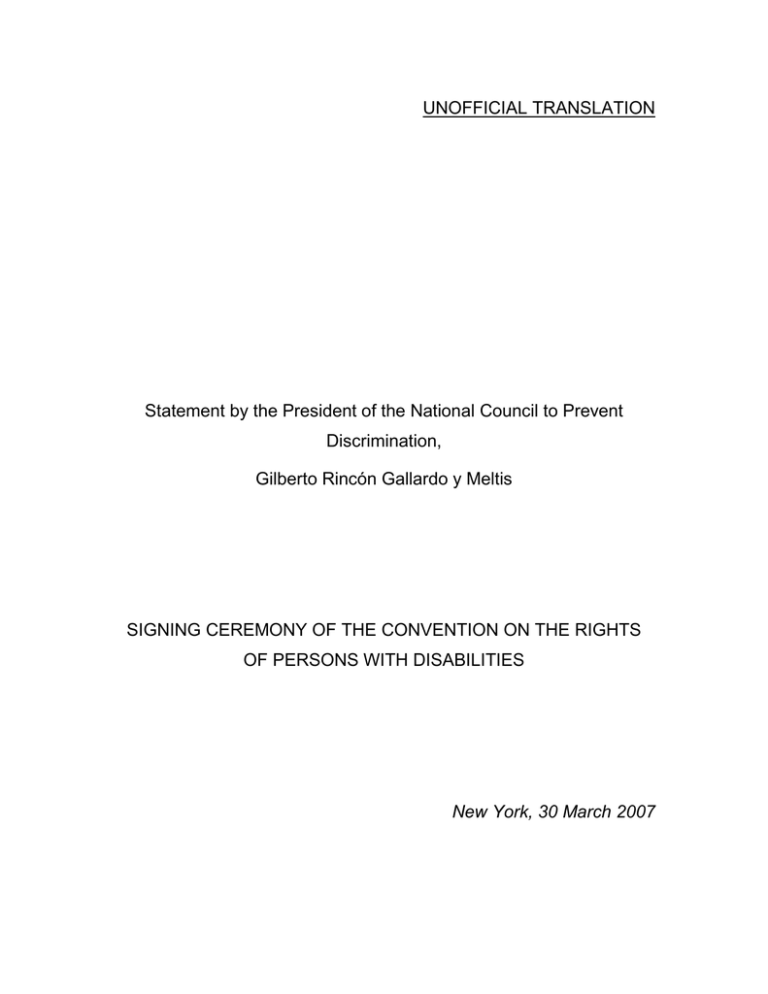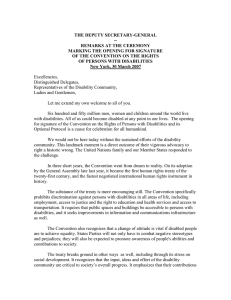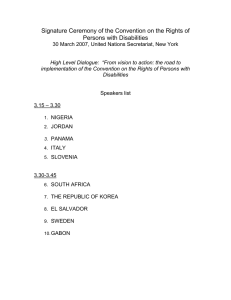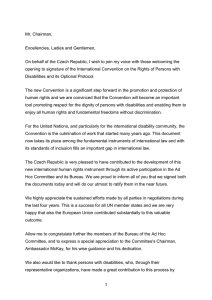Mexico English - ceremonia firma discapacidad ingles FINAL
advertisement

UNOFFICIAL TRANSLATION Statement by the President of the National Council to Prevent Discrimination, Gilberto Rincón Gallardo y Meltis SIGNING CEREMONY OF THE CONVENTION ON THE RIGHTS OF PERSONS WITH DISABILITIES New York, 30 March 2007 2 It is an honor for me to represent the Government of Mexico and be entrusted by President Felipe Calderón to participate in this signing ceremony of the Convention on the Rights of Persons with Disabilities and its Optional Protocol. We are fully pleased that a special ceremony is held on the occasion of the signature of this Convention. This allows us all, to witness this new stage of the first international legal instrument of human rights adopted by the United Nations in the 21st century. The Convention and its Optional Protocol fill in a gap in the international legal framework. They will contribute to enhance a cultural shift in our societies in the way we address the situation of persons with disabilities. Perhaps, the most relevant aspect of this new treaty is that it goes beyond the traditional medical-assistential approach, thus making one step forward in the full acknowledgement of persons with disabilities as subjects of rights and active members of society, with full autonomy and freedom to make decisions. This should be reflected in the national legislative frameworks of each State. 3 We hope the Optional Protocol is signed and ratified with the same enthusiasm as the Convention, thus granting persons with disabilities with a powerful mechanism to protect their rights. My country recognizes the importance of the respect of human rights in the world, as well as its own internal weaknesses. Therefore, we have been one of the main promoters in the establishment of the UN Human Rights Council. It would be desirable that during Mexico’s Presidency, the Council is consolidated as the prominent UN body in charge of protecting and promoting human rights. Furthermore, once the instrument enters into force, the States Parties will have to face with resolve the great challenge of harmonization with domestic law. Fortunately, in Mexico we will not start from scratch, since our Constitution includes dispositions of non discrimination for reasons of disability; we also count with the Federal Act to Prevent and Eliminate Discrimination, and the General Act for Persons with Disabilities. Today, we take another step towards a new stage in respect to the rights of persons with disabilities around the world. The immediate challenge will be to work towards achieving the necessary ratification instruments for the entry into force of the Convention. I fully count on the Mexican Congress to approve the ratification of this instrument. 4 However, once it comes into force, we have to redouble our efforts, inter alia, through the Conference of States Parties towards the establishment of a Committee of Experts, as envisaged in the Convention. Mexico will be an active actor. We face many challenges, let’s start now. Let’s make a culture that promotes non discrimination against persons with disabilities real. Let’s strive towards the full participation of organizations of persons with disabilities in the elaboration of public policies for the implementation of the Convention. Let’s enforce the compliance of the principles of the Convention into local legislations. On behalf of my Government I would like to congratulate and thank all those governmental representatives that played an outstanding role in this negotiation process. In a very special way, I would like to point out that this instrument that is opened to signature today could not have been possible without the direct participation of persons with disabilities. Their experience was the impetus that made it happen.



